Langue and Parole: Saussure
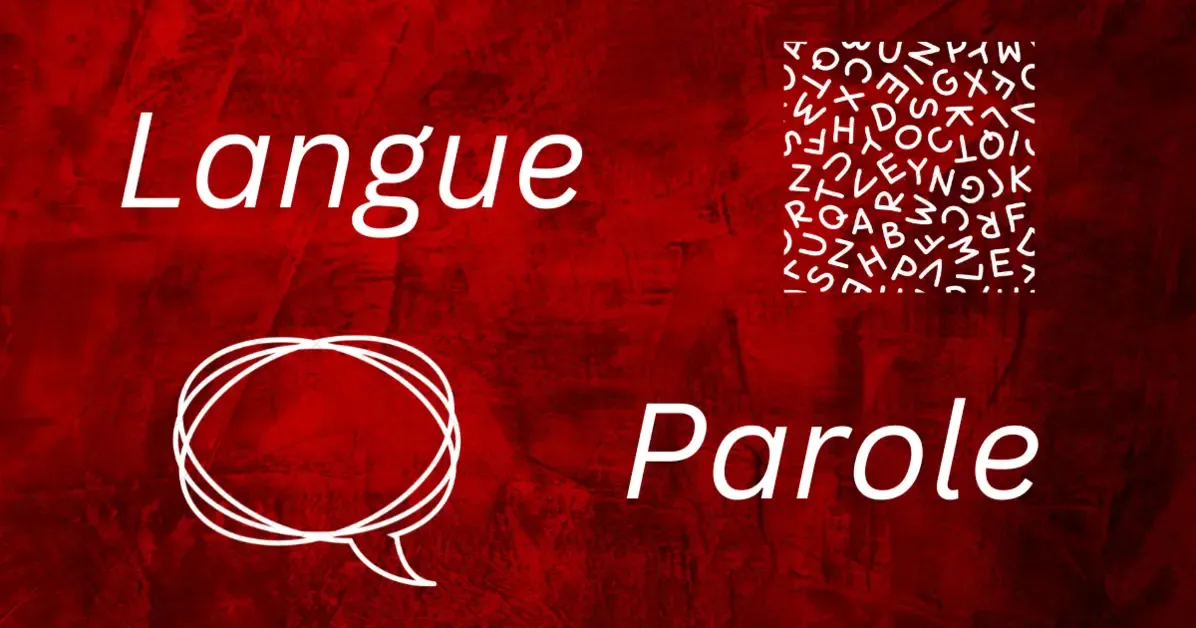
Swiss linguist Ferdinand de Saussure discusses the concept of Langue and Parole in the third chapter titled ‘The Object of Linguistics’ in his ‘Course in General Linguistics’ (translated by Wade Baskin). Prior to Saussure, linguists had only been interested in studying the history of language, its growth and changes through the years. Additionally, they were only focused on the written words and texts. He also discusses the nature of the linguistic sign in the very first chapter of the 'Course in General Linguistics'
In contrast, Saussure asks a very fundamental question: What is the nature of the subject that is studied in linguistics? Rather than focusing on the written word, he turned his attention towards the spoken word. Through Langue and Parole, Saussure makes crucial distinctions within language.
Langue and Parole pdf
This blog explores
- What is Langue and Parole?
- Characteristics of Langue and Parole
- Langue vs Parole
- Langue and Parole in structuralism and literature
What is Langue and Parole?
Langue and Parole is a dichotomy where the French term langue stands for the system, conventions, and rules that are adapted by a community to enable communication. Parole, on the other hand, refers to the act of speech. To understand the concept of langue and parole, let us consider that you meet your friend and want to greet her. This speech circuit will include the following steps as illustrated in the image below.
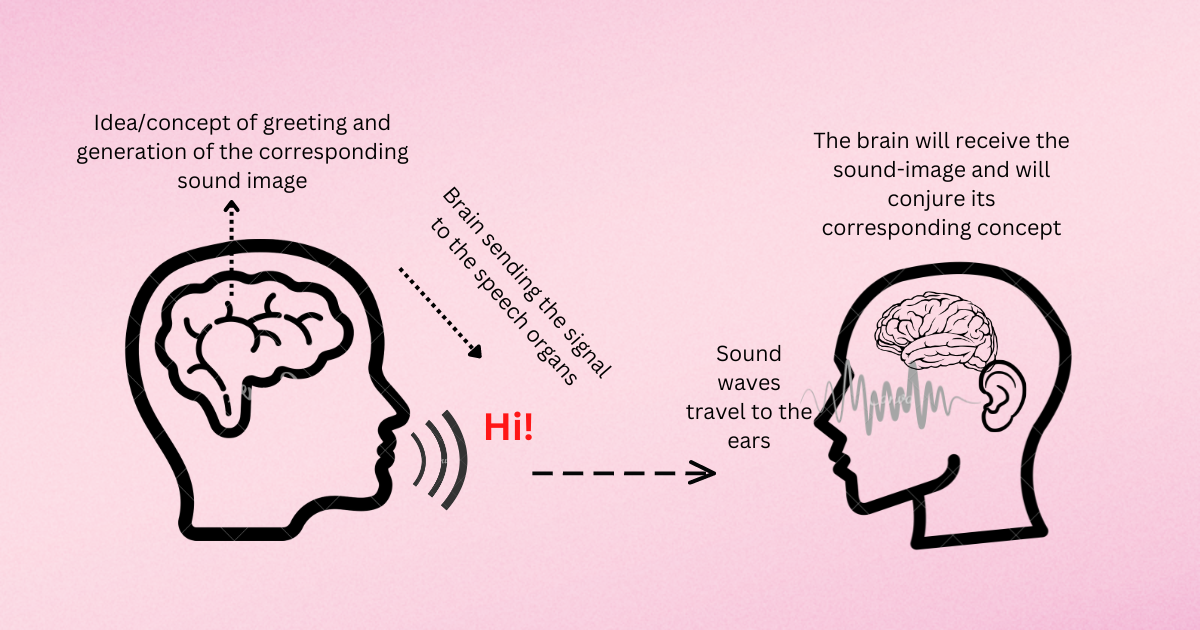
Step 1: In your brain, the impulse to greet your friend is created.
Step 2: Your brain will generate a sound image of “hi” which is corresponding to the idea of greeting. This is a completely psychological process.
Step 3: The brain will now send the sound-image as an impulse to all the organs that contribute to speech such as vocal chords, tongue, mouth, etc. This is entirely a physiological phenomenon.
Step 4: You say “hi” and the sound waves travel from your mouth to the ears of your friend. This is a physical process.
Step 5: For your friend, the process will now be in reverse. The sound wave will now travel from the ear of your friend to her brain. The brain will receive the sound image of “hi” . It will then form the psychological connection between the acoustic image “hi” and the concept of greeting.
From the above example, we can easily separate the physical phenomenon of speech from the act of utterance or phonation, and the psychological aspects of sound-image and the concept. We can also make the following significant distinctions:
- Distinction between the outer part that includes the sound waves traveling from your mouth to your friend’s ears, and the inner part that includes the creation and perception of the sound-image, concept/idea, etc.
- Active and passive sections. Everything from your brain to the ears of your friend is active. On the other hand, everything related to the ears of your friend and his perception is passive.
Through Langue and Parole, Saussure separates language from the act of speaking. In doing so he separates:
- Social from Individual: The act of uttering the word “hi” is completely separate from the social connotation of greeting.
- Essential from accessory or in some cases accidental.
Based on the above example, the societal conventions and grammatical rules that require you to say hi to your friend constitute langue. The utterance of the word “hi” is parole.
Characteristics of Langue and Parole
Following are the main characteristics of langue and parole.
Significant characteristics of Langue or Language
Unlike parole or speech, Language or langue is not controlled by the individual speaker. Instead, it is a product that is passively assimilated and adopted by you. You never have to premeditate or reflect about language. For example, while saying hi to your friend, you did not have to think of the rules or grammar before. Words of greeting such as hi, hello, etc are already ingrained in our minds.
Langue is well-defined with a fixed set of rules. Language exists where the sound-image is linked to a concept/idea/object. It constitutes the social aspect of speech and is therefore out of the control of an individual. For instance, you cannot conjure words to greet people on your own. You will have to use the ones that are already in practice by the people who speak and understand a common language.
Another significant characteristic of langue or language is that we cannot modify it. Instead, we learn and inculcate langue since our childhood and take time to become adept at it. Even when someone cannot speak, we can still recognize language if we understand and hear the vocal signs.
Langue can be understood exclusively from Parole. All the dead languages such as Ancient Greek, Coptic, Sanskrit, and Latin are still studied even when there are no native speakers. Langue is not dependant on Parole.
Language or langue is also a homogeneous and unified system with set rules. It contains sound images with their corresponding meanings, and both of them are psychological. However, this does not mean that language is abstract. Langue is concrete as it is adopted and practiced by a community of people and can be reduced to written symbols. In langue, all sound images have a corresponding visual image and written word. This is why dictionaries and grammar books are accurately able to represent langue accurately. Langue is a collection of sound images, and the written word is the tangible form of these sound images.
Characteristics of Parole.
Langue and Parole are dichotomies in the sense that while langue represents language, Parole represents speech. Unlike langue, parole is an individual act, entirely in control of the individual. It is an intellectual act. Since it is in control of a speaker, Parole is heterogeneous and is not defined. It is impossible to have or capture in detail, the act of speaking since it entails innumerable muscular movements and is difficult to identify.
Langue vs Parole
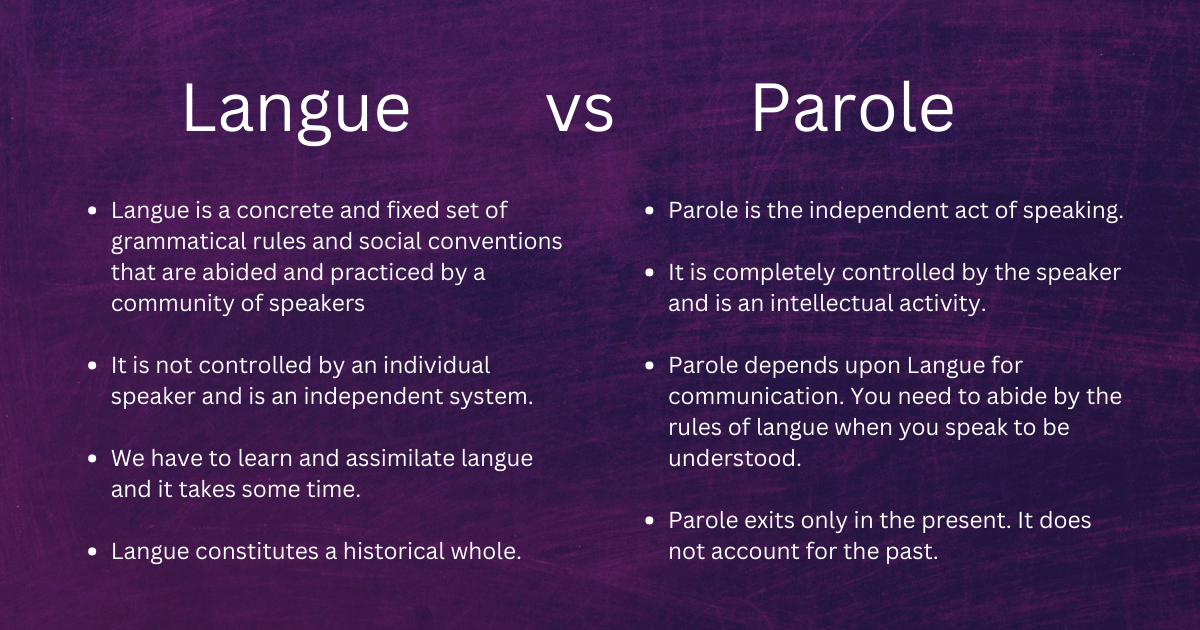
- Langue is the system of grammatical rules and societal conventions that is practiced by a community to be able to communicate. Parole on the other hand is an individual act of speaking and is dependent on langue.
- Langue is universal and is a constant system. However, Parole is heterogeneous and changes with every individual utterance and pronunciation.
- Langue constitutes historic systems- for instance, all of the English language since its beginning to what it is now. Parole however, is momentary and is only a small part of langue. It is independent of history. Parole is a very small part of a larger system-langue.
We might claim that since speech is way more natural, and that language is acquired and learnt, parole must be more important than langue. However, Ferdinand de Saussure refutes this perception in his 'Course in General Linguistics'. He claims that it cannot be proven that our vocal chords were exclusively designed for language, just as our legs were designed for walking. According to William Dwight Whitney, the use of our vocal chords is entirely by chance, luck, and convenience. Humans could have used hand gestures or visual symbols just as effectively. According to Saussure, speech is not what is natural to us. What is natural to us is the “faculty of constructing a language”. (Saussure, p 10).
Langue and Parole in structuralism and literature
The dichotomy of langue and parole was so impactful that it is utilized by structuralists in literature and is an important part in structuralist literary theory. For example, let us consider the novel, ‘Great Expectations’ by Charles Dickens. The individual novel by Dickens, is a literary work that practices and abides by conventional rules of a literary novel. In this case, the literary novel becomes langue, whereas Great Expectations by Dickens becomes parole.
Frequently Asked Questions
Q. What is Langue and Parole in English Language?
If we consider the English language, all its grammatical rules such as the tenses, verbs, adjectives, active and passive, conjunctions, prepositions, etc constitute the langue. On the other hand the very act of speaking in English, according to the langue, is called parole.
Q. What is the concept of langue?
As explained above, langue includes all the rules of a particular language. Every single language, be it English, Hindi, Sanskrit, Spanish, French, etc. has its own rules. One needs to follow these rules in order to be intelligible to the listeners.
Q. Who first distinguished between langue and parole?
Swiss linguist Ferdinand de Saussure was the first to distinguish between langue and parole. He discussed the differences in the third chapter 'The Object of Linguistics' from his seminal work ‘Course in General Linguistics'.
Read More
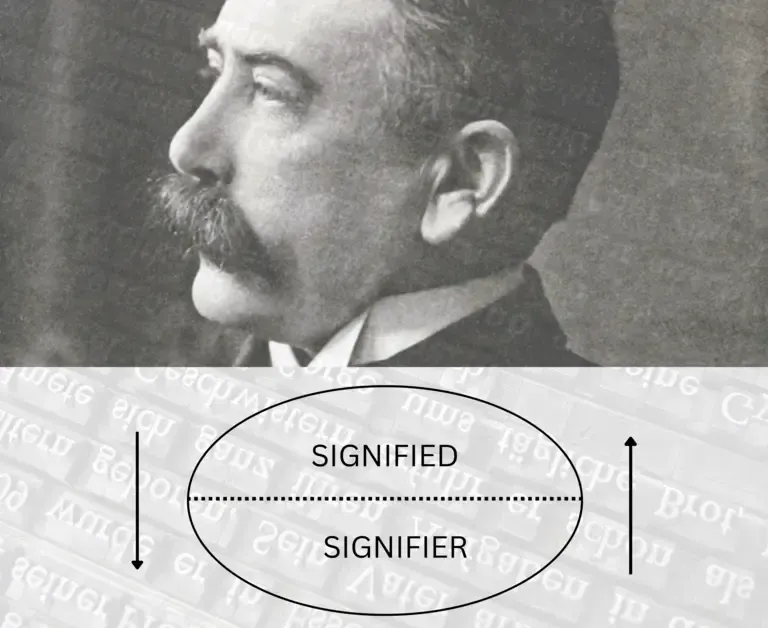
Linguistic Sign
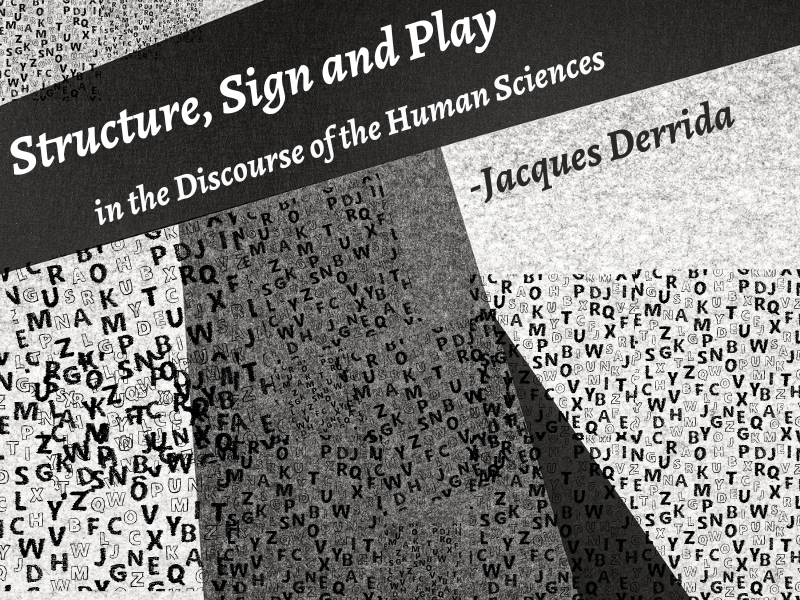
Derrida's Structure, Sign and Play

Intellectuals and Power

